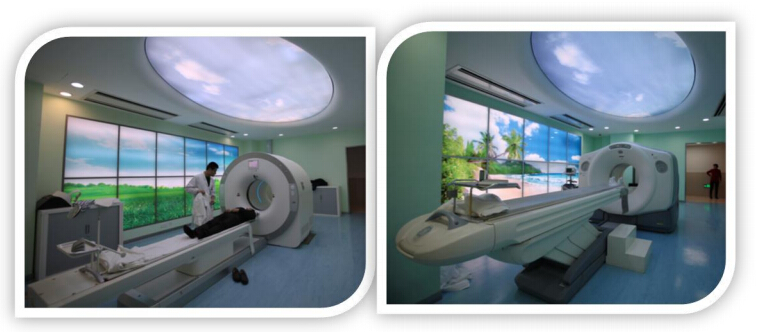
Introduction
Nuclear Medicine Department of Zhongshan Hospital Affiliated to Fudan University is founded in 1958 by Prof. Rong Dushan and is an important base for clinical practice, research, teaching, and pharmacology of in nuclear medicine. The Department’s overall medical and research level is among the best in China, and it’s also one of cradles for Chinese Nuclear Medicine. In 2014, the department was listed as the Shanghai Branch Zhongshan Hospital Training Base of Asian School of Nuclear Medicine (ASNM), the Standardization of National Specialist Physicians Training Base, and is authorized as a clinical key specialty.
Nuclear Medicine Department has always placed great emphasis on building a multilevel team, and physicians on a higher level will coach and pass on experience to those on the lower, forming a virtuous circle. Our team has 41 technical staff, including 16 physicians, 16 technicians, 5 nursing staff, and 4 radiopharmaceutical staff. Among them, five hold senior titles, fifteen junior titles, and one from Fudan University Key Post Brain Gain programme. It is encouraged at our department to master as many skills as possible, and more than 10 medical and technical staff have acquired working licenses of NMI, CT and MRI.
Director of the department, chief physician Shi Hongcheng is also a member of the standing committee and the head of oncology department of Chinese Society of Nuclear Medicine (CSNM), a member of the standing committee of CAONMP of Chinese Medical Doctor Association, the Deputy Director of Shanghai Nuclear Medicine Association and the board member of several journals, including Chinese Journal of Nuclear Medicine and Molecular Imaging.
The department covers an area of more than 4200 m2, comprising four centres, namely PET Molecular Imaging Centre (over 2000 m2), Single-photon Function Imaging Centre (over 1000 m2), Radioactive Nuclide Treatment Centre (over 900 m2), and Nuclear Medicine Experiment Centre (over 300 m2).
Clinical Features

Nuclear Medicine Department owns two PET/CT Imaging Systems, three SPECT/CT Imaging Systems with diagnosis level CT, one SPECT, and one mammary gland specific gamma camera, and special wards for internal radiation therapy. About 8000 patients undergo PET/CT examination, about 14000 patients receive SPECT examination, and about 500 patients undergo Radioactive Iodine-131 Therapy for treating Differentiated Thyroid Carcinoma (DTC) each year. It is planned to purchase high-end cardiac gamma camera, PET/MR and other medical equipments in recent years.
The department also houses various laboratory facilities including one PET/MR for small animal experiments, and have ordered high-power medical cyclotron as well as other advanced facilities.
Clinical work can be divided into imaging diagnosis and radionuclide treatment. In terms of imaging diagnosis, the department offers PET/CT tumour imaging, PET/CT myocardial metabolism imaging, nuclear cardiology examination, nuclear medicine diagnosis of nervous system, internal system, skeletal system and digestive system, pulmonary and ventilation imaging, renal dynamic imaging, and mammary gland specific gamma camera imaging, etc. Radionuclide treatment includes 131I treatment of hyperthyroidism, treatment of DTC metastases, and bone metastasis pain of carcinoma, and other programmes.
Teaching and Scientific Research Achievements
The department has made great achievements in studies on nuclear medicine imaging, development of radiopharmaceuticals, radionuclide therapy and other areas. It has been awarded several National Natural Science Foundation and several research advancement rewards at provincial and ministerial level. In the past five years, more than 40 SCI papers and over 100 CSSCI papers have been published. The department also harvested many research findings in pharmaceutical science in collaboration with Chinese Academy of Sciences and Harvard Medical School.
As a crucial component in a comprehensive teaching hospital affiliated to Fudan University, Nuclear Medicine Department has been responsible for teaching undergraduate and international students of nuclear medicine major of Fudan University for years. The department also offers master and doctoral programmes for students of medical imaging and nuclear medicine majors, nurturing a considerable amount of nuclear medicine talents for the country. Over 40 doctoral and master students have graduated from the department. The department is among the first batch in the country to be granted as a professional training base for resident physicians, and has contributed to revising the Ministry of Health Training Programme for specialist physicians (nuclear medicine major). Each year, the department offers training for more than 20 resident physicians and provides job rotation training for clinical graduate students from different specialties.
In terms of continuous education, the National Isotope Workshop in early days has trained the first batch of nuclear medicine talents, and many of them have become leading figures in nuclear medicine all over the country. The department has held the national continuous education programme “SPECT/CT Clinical Application and Development” workshop for several consecutive years. Many renowned professors from home and abroad have been invited to give lectures on clinical practice and research findings in nuclear medicine. Meantime, the department selects one or two postgraduate or doctoral student(s) each year and sends them to the first-class academic medical research institutions in the United States or European countries. They have played a vital part in constantly improving research competence and teaching methods of the department so as to keep pace with the international community.



